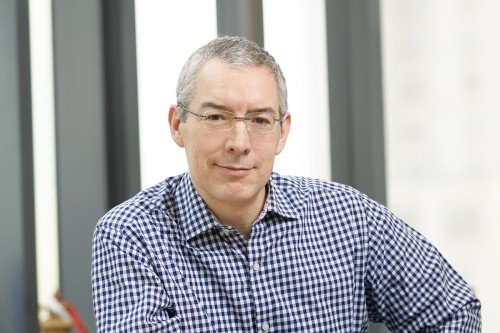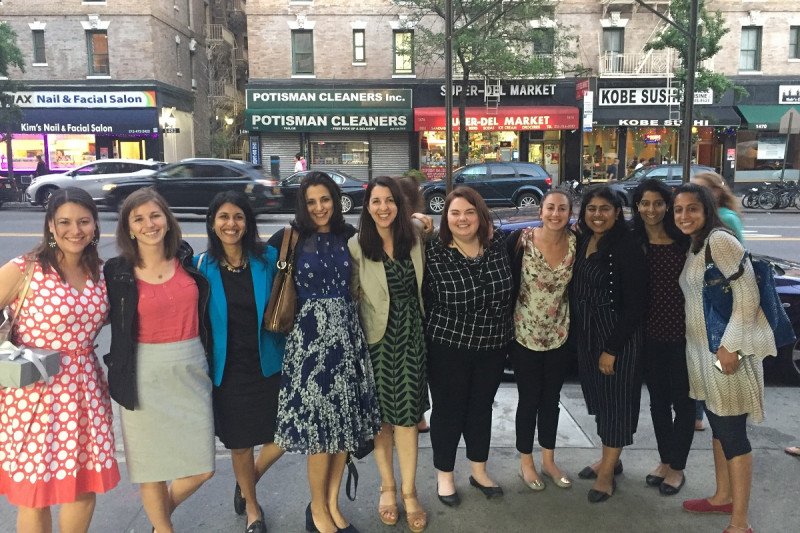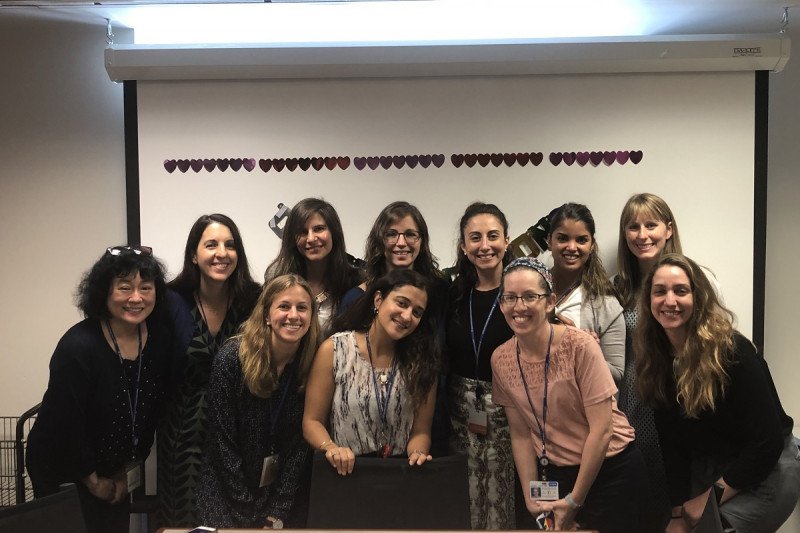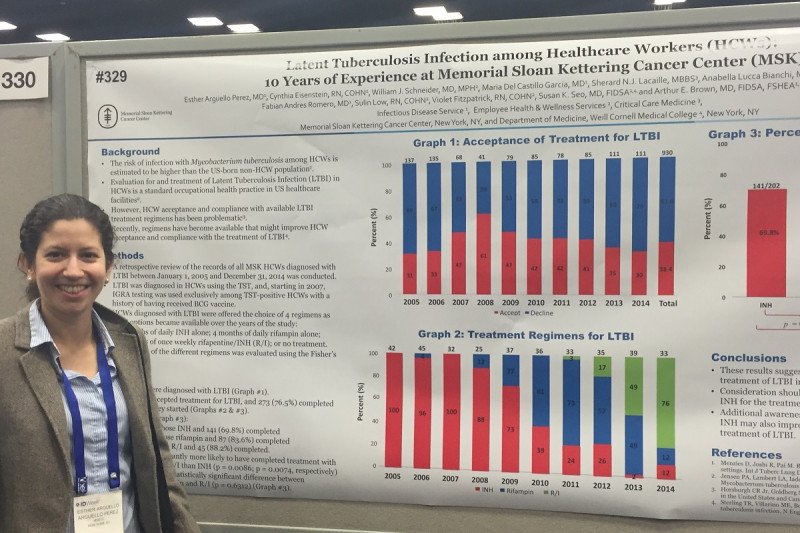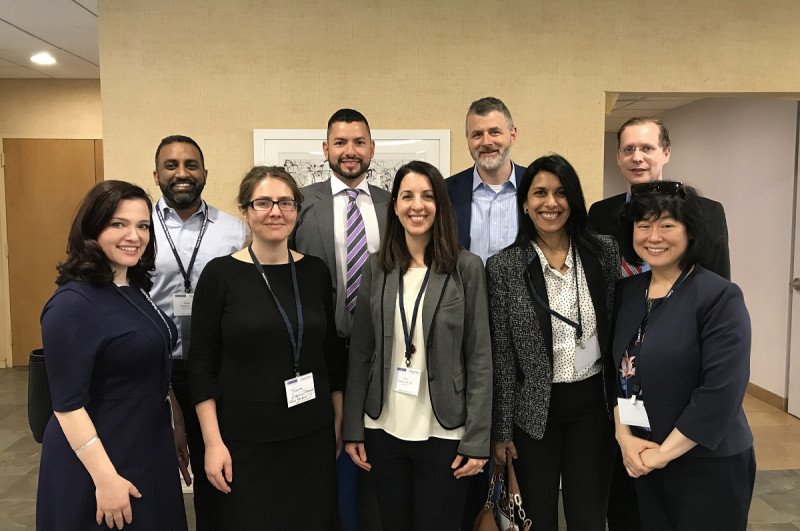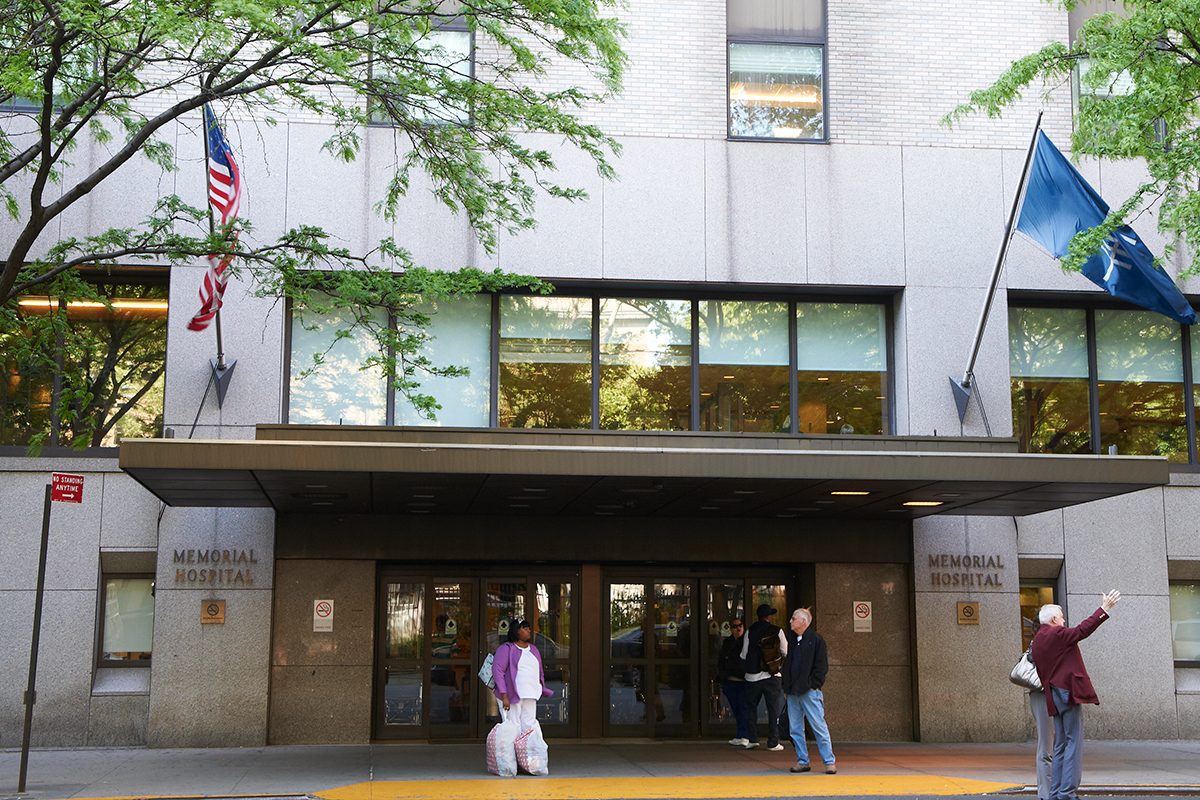
Memorial Hospital serves as the principal teaching site for our fellows. Memorial More than 17,000 surgical cases and more than 200,000 radiologic procedures are performed at Memorial Hospital annually.
The ACGME-approved infectious diseases (ID) fellowship program at Memorial Sloan Kettering provides a broad-based educational experience that includes the evaluation and management of a wide variety of infectious diseases that occur in medical and surgical patients, both adult and pediatric, and in the inpatient and outpatient settings.
The ID fellowship at MSK is unique because it is the only ID training program in the United States based at a cancer treatment center. Trainees become experts in the management of infections associated with cancer treatment, including allogeneic hematopoietic stem cell transplantation, checkpoint blockade treatment to enhance T cell-mediated clearance of tumors, and T cells expressing tumor-specific chimeric antigen receptors.
The MSK ID fellowship program has trained many distinguished ID specialists who have entered public health or academia and become leaders in the field. The academic programs and resources of MSK, its tradition of clinical and scientific excellence, and the high quality of other subspecialty programs throughout the hospital have provided MSK ID fellows with a supportive environment for clinical learning and scholarship. A number of former ID fellowship trainees hold career development awards from the National Institutes of Health (NIH) and oversee NIH-funded laboratory research programs.
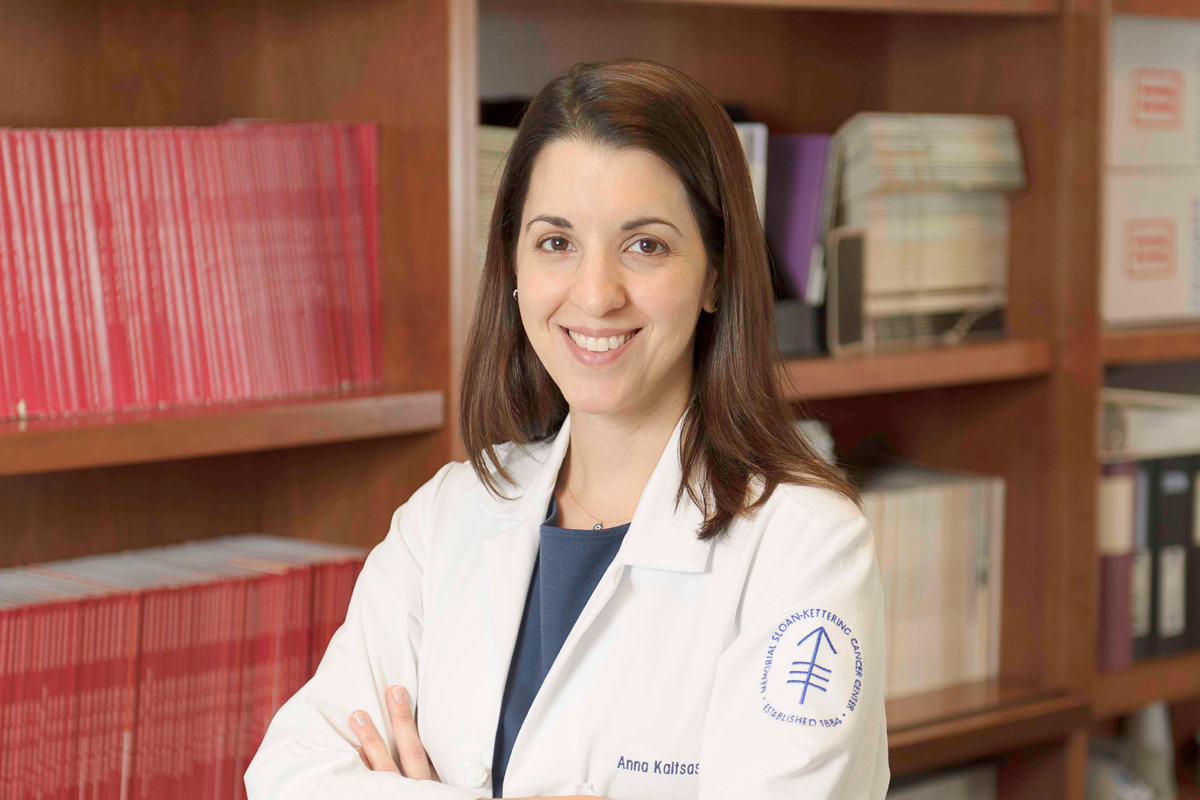
Anna Kaltsas, MD – Fellowship Program Director
Dr. Kaltsas is the Director of the Infectious Diseases Fellowship Program, assistant attending physician at Memorial Hospital, and assistant professor of clinical medicine at Weill Cornell Medical College. Her areas of clinical expertise include the management of infections and infectious complications in people with cancer. Her research interests include C. difficile and invasive pneumococcal infection rates in cancer patients, among others.
Dr. Kaltsas earned her medical degree from Albany Medical College with honors, followed by internal medicine residency at New York-Presbyterian–Weill Cornell. She completed a three-year infectious disease fellowship at Albert Einstein College of Medicine/Montefiore Medical Center, during which time she also pursued a master’s degree in clinical research.
Dr. Kaltsas has an interest in medical education and oversees the infectious disease fellowship at MSK, as well as rotations from interested medical students, interns, residents, and fellows from other institutions and other specialties on the infectious disease service.
Program Description
Fellows are assigned to Tuesday afternoon or Friday morning clinic during their fellowship training. In their assigned clinics, fellows treat long term and newly diagnosed HIV patients, internal and external referrals, and patient follow-ups from in-house consultations. In the COVID and post COVID era, fellows are increasingly “seeing” new patients and follow ups as virtual visits with their attendings.
Fellows also attend the Employee Health and Wellness clinic approximately four to six times a year to become proficient at evaluation and management of employees with LTBI or exposure to blood-borne pathogens.
| Clinical Micro Rotation | MSK Inpatient Consults | NYPH-Cornell Inpatient Consults | NYU-Bellevue Inpatient Consults | Research (includes 1 month vacation) | |
|---|---|---|---|---|---|
| First Year | 1 month | 6-7 months | 1 month | N/A | 2-3 months |
| Second Year | N/A | 2-3 months | N/A | 1 month | 8-9 months |
| Optional Third Year | N/A | N/A | N/A | N/A | 11 months |
MSK Inpatient Consults
Inpatient consults for fellows are divided between two teams: the regular consult service, Blue Team, and the immunocompromised host service, Red Team, which consists of leukemia and transplant patients. Fellows alternate between Blue Team and Red Team over the course of their fellowship. To unload the consult burden from fellows, there is also an attending only service comprised of consults deemed of low educational value for fellows.
Outside Rotations
NYPH-Cornell and NYU-Bellevue Inpatient Consults
Fellows rotate for one month on the inpatient service at New York Presbyterian/Weill Cornell Medical Center as first-year fellows and for one month at NYU-Bellevue in either their first or second year of fellowship. There they encounter infectious problems occurring in a different hospital setting where patient populations include immunologically normal hosts, the elderly, patients with alcohol and/or drug abuse histories, returning travelers, and recent immigrants. Infectious disease fellows from these respective programs also function as full fellows and members of the Infectious Diseases Service during their time at MSKCC.
Ambulatory Care
To enhance the fellows’ ambulatory care experience, second-year fellows complete one month rotations at the STD clinic at SUNY Downstate Medical Center in Brooklyn and the ID Associates/Travel Medicine Clinic of NYP/Cornell.
Elective time is offered to second year fellows who wish to pursue clinical rotations at local New York hospitals if arranged beforehand with the program director and leadership at the hospital in question. Recent electives pursued by fellows include a solid organ transplantation elective at Mount Sinai and outpatient HIV clinic elective at NYP/Cornell.
Research
During one research block in the second year of fellowship, fellows spend eight half-day sessions at SUNY Downstate’s STD clinic. During another research block in the second year of fellowship, they spend six half-day sessions at the ID Associates/Travel Medicine Clinic affiliated with NYPH-Cornell.
Approximately fifty percent of MSK ID fellows seek additional research training that is not required for ID Boards certification. This is completed in an optional third year. See the Research section for additional information or visit the ID faculty members’ web pages to see the groundbreaking cancer research ID fellows are currently participating in.
Fellow Responsibilities
Specific responsibilities are distributed throughout the two to three years of the fellowship. In general, the first-year (junior) fellows provide the majority of inpatient care. Second-year (senior) fellows provide leadership and serve as role models for the junior fellows and other rotators to the ID service. The senior fellows are also responsible for organization and preparation of monthly call schedules, organization of monthly TransYork rounds; end-of-the-year presentation of their own research work at the “Advanced Topics in Infectious Disease” lecture series; supervision of the Blood Culture Quality Improvement (QI) Project and other QI projects; representation to the ID fellowship’s Program Evaluation Committee; and representation to the hospital’s Graduate Medical Education (GME) committee.
Microbiology Rounds
Plate rounds are held every Wednesday morning from 9:30 – , either in person or virtually. Clinical microbiology fellows or the ID fellow on microbiology rotation present an interesting clinical case and an analysis of the microbiologic work up, as well as review of relevant microbiology material. The educational programs for both the clinical microbiology fellowship and the infectious disease fellowship at MSK are closely intertwined, and fellows from both programs gain from joint faculty expertise and research opportunities. Director Esther Babady supervises the microbiology laboratory.
Antibiotic Approvals
The Antibiotic Management Program (AMP) handles antibiotic approvals seven days a week from 9:00 am to After hours the approval pager is rolled over to the ID fellow on call; no antibiotic approval is required between and The bulk of night approvals generally occur before Ample research opportunities exist with the antibiotic management program as well as additional training in this very important area of infectious disease. Fellows also spend time during their microbiology month in first year becoming familiar with the AMP program and our ID pharmacists.
Blood Culture Quality Improvement (QI) Project
As part of an ongoing QI project, the charts of all patients with one or more positive blood cultures (with the exception of coagulase-negative staphylococci recovered from a single blood culture) are reviewed by the on-service ID fellows to ensure adequacy of empiric antimicrobial therapy. The on-service attending serves as backup for the fellows. Formal consultation may be necessary to assist in the management of complicated bloodstream infections.
Needlesticks, Splashes, and Other Occupational Exposures
After hours and on weekends and holidays, the ID fellow may be contacted regarding an employee who has or was exposed to an infectious agent or who had an accidental needlestick or splash exposure (varicella, measles, mumps, rubella, pertussis, and various respiratory viruses including influenza). There is always an Employee Health attending on call that can guide and maximize ID fellow learning through these situations.
Conferences
|
Tuesday |
8:30-9:30AM |
ID summer lecture series/Journal Club Early in the year, core concepts/topics in infectious disease are taught by faculty from both Cornell and MSK in this joint conference series for MSK and Cornell ID fellows. In the latter part of the year, faculty and fellows present 1-2 articles from recent ID literature for analysis and review, in classic journal club fashion. |
|
Wednesday |
9:30-10:00AM |
Microbiology Plate Rounds |
|
Wednesday |
12:00-1:00PM |
Research in Progress (spring only): Faculty and fellows present their latest projects and research findings; faculty presentations serve as introductions to their work so fellows can familiarize themselves with possible research areas of interest and mentors. |
|
Wednesday |
2:00-3:00PM |
Infection Control Meeting |
|
Thursday |
1:30-2:30PM |
ID Clinical Conference: On-service fellows each present a case followed by a discussion that encompasses a focused, but thorough, literature review and summation of the critical points of the case. Pertinent radiographs and important smears or biopsies should be shown. |
|
Friday |
8:00-9:00AM |
Department of Medicine Grand Rounds |
|
Friday |
1:30-2:30PM |
Advanced Topics in Infectious Diseases (Grand Rounds): Joint conference organized by the Infectious Diseases Divisions of MSKCC and Weill Cornell Medical College. Guest speakers from local and distant academic institutions present on topics of their expertise. |
Research
Memorial Sloan Kettering has a long history of conducting research on the management of infectious diseases in immunocompromised patients. In the 1970s, our Infectious Diseases Service performed pioneering studies on the diagnosis of and therapy for infections in patients undergoing intensive chemotherapy for cancer, and in the 1980s we became a center for the study and treatment of AIDS. In recent years, the research focus of the Infectious Diseases Service has been extended to clinical and laboratory investigation of immune responses to bacterial, fungal, and viral infection.
Our laboratory and clinical investigators are studying adaptive and innate immune responses to infection in patients undergoing cancer chemotherapy and stem cell transplantation.
Broadly speaking, clinical investigation within the Infectious Diseases Service focuses on diagnosis and therapy of infections in the compromised host and hospital infection control. Collaborative clinical research projects between the Infectious Diseases Service and other services within Memorial Sloan Kettering focus on monitoring and augmenting antiviral immunity in transplant patients and people receiving other forms of cancer therapy.
Quantitative methods are being used to identify and characterize T lymphocyte populations that combat viral and fungal infections in immunocompromised patients. On a more basic research level, laboratories of the Infectious Diseases Service are studying infectious diseases in animal models to develop a deeper understanding of immune defenses against invasive microbes.
Laboratory Research
The research laboratories of the Infectious Diseases Service at Memorial Sloan Kettering are focused on the immune response to infection by bacterial, fungal, and viral pathogens. The pathogenesis of mycobacterial infections is also actively investigated. Interested fellows are encouraged to work in the laboratory on research projects that characterize the interface between the mammalian immune system and pathogens in the setting of infectious disease.
Fellows are provided with on-site training in laboratory investigation and also have opportunities to participate in basic science course work. Fellows with interest in microbiology, cell biology, and other fields have a variety research options at MSK along with opportunities at The Rockefeller University and Weill Cornell Medical College.
Clinical Research
Infectious Diseases fellows can become involved with, and may initiate, a broad range of clinical studies. Research projects may include clinical reports, case series, and epidemiologic investigations. Faculty members within MSK or from The Rockefeller University or Weill Cornell Medical College who are associated with the MSK Infectious Diseases Service will supervise all research projects.
Though most clinical studies typically occur within the Infectious Diseases Service, they often cross borders into other disciplines. Thus, collaborative studies with other clinical services (including lymphoma, leukemia, and transplant) are commonplace and encouraged. The close relationship between the Clinical Microbiology Service and the Infectious Diseases Service also provides many opportunities for fellow-initiated research projects.
Lucille Castori Center for Microbes, Inflammation & Cancer
In January 2010, Memorial Sloan Kettering created a multidisciplinary research center to shed light on the role that microbes and the body’s inflammatory and immunological responses to them play in the development of cancer. The Lucille Castori Center for Microbes, Inflammation, and Cancer unites researchers in the areas of molecular biology, immunology, computational biology, and microbiology and members of the Infectious Diseases and Clinical Microbiology Services in Memorial Hospital.
In addition to facilitating research among MSK’s investigators and clinicians, the Castori Center provides grants for clinical and laboratory-based fellows to extend their research and training.
The fellowship director, service chief, and other faculty speak with each fellow individually regarding potential projects in the first months of fellowship. By fall of the first year of fellowship, fellows generally have identified a few areas of potential interest and a specific mentor for each area.
Former Fellows
Many of our Infectious Diseases fellows have gone on to illustrious careers in academia, research, and clinical medicine, both in the United States and abroad. Our program has also trained many of our own current faculty members.
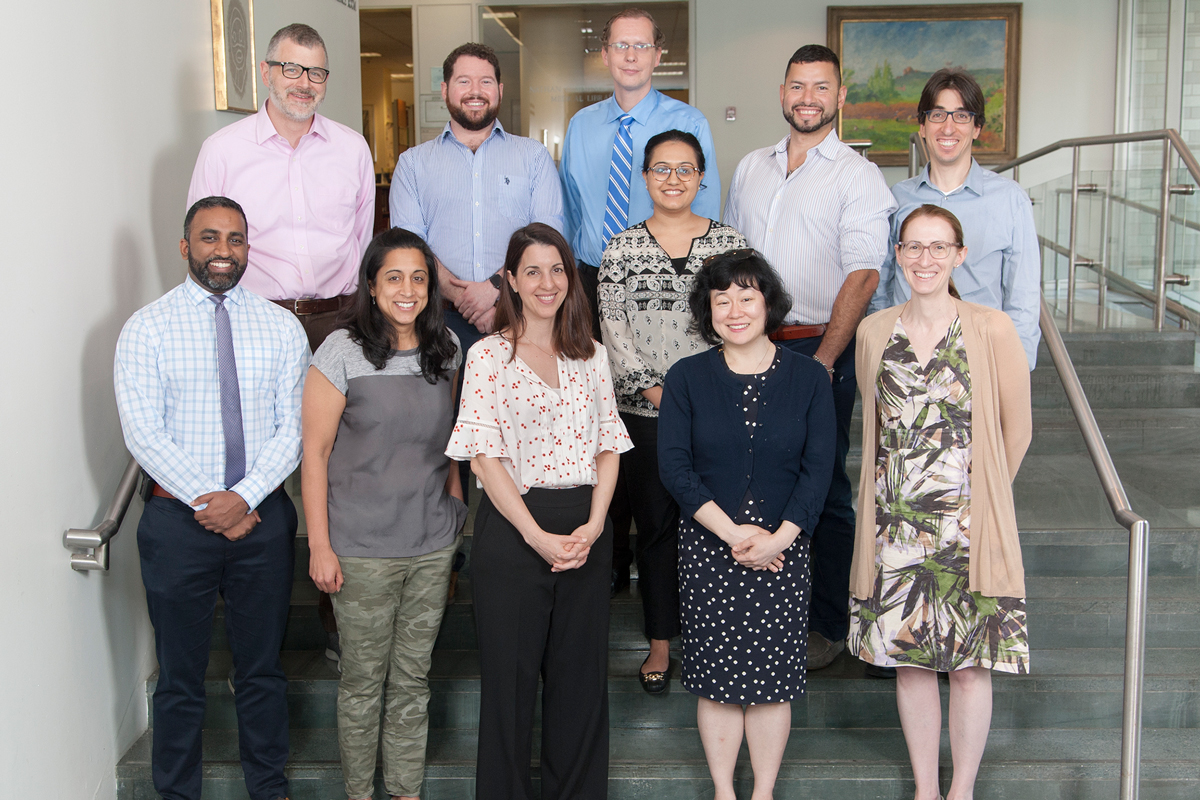
2017 – 2018 former fellows from back to front: Service Chief Tobias Hohl, Rocco Richards, Markus Plate, Alejandro Herrera, Assistant Attending Gil Redelman-Sidi, Ritu Kathuria, Shane Alexander, Instructor Sejal Morjaria, Program Director Anna Kaltsas, Attending Susan Seo, Assistant Attending Elizabeth Robilotti.
2019-2020
Yael Bogler
Tamara Nawar
Mario Caldararo
Marilia Bernardes
2018-2019
Yael Bogler
Tamara Nawar
Shane Alexander
Ritu Kathuria
2017-2018
Rocco Richards
Markus Plate
Alejandro Herrera
Shane Alexander
Ritu Kathuria
2016-2017
Markus Plate
Rocco Richards
Alejandro Herrera
Tilly Varughese
Alexandra Franco
2015-2016
Tilly Varughese
Esther Arguello Perez
Fabian Romero
Alexandra Franco
Lena Heung
Sejal Morjaria
2014-2015
Esther Arguello Perez
Fabian Romero
Maria Del Castillo Garcia
Lena Heung
Anabella Lucca Bianchi
Sejal Morjaria
2013-2014
Maria Antonieta Del Castillo
Cesar Figueroa Ortiz
Lena Heung
Sherard Lacaille
Anabella Lucca Bianchi
Sejal Morjaria
Paola Palomino
2012-2013
Cesar Figueroa Ortiz
Ubonvan Jongwutiwes
Sherard Lacaille
Yeon Joo Lee
Tarek Mikati
Paola Palomino
Lalitha Parameswaran
Gil Redelman Sidi
2011-2012
Cesar Figueroa Ortiz
Ubonvan Jongwutiwes
Yeon Joo Lee
Tarek Mikati
Lalitha Parameswaran
Urania Rappo
Gil Redelman Sidi
2010-2011
Radoslava Klein
Yeon Joo Lee
Peter Augustus Mead
Tarek Mikati (Research Fellow)
Lalitha Parameswaran
Urania Rappo
Gil Redelman Sidi
2009-2010
Radoslava Klein
Peter Augustus Mead
Tarek Mikati
Urania Rappo
Gil Redelman Sidi
2008-2009
Daniel Barkan
Carlos Jarmillo
Tarek Mikati
Agam Rao
Gil Redelman Sidi
Ying Taur
2007-2008
Daniel Barkan
Tobias Hohl
Ashwin Jathavedam
Carlos Jarmillo
Mini Kamboj
Mirella Mircescu
Agam Rao
Ying Taur
2006-2007
Daniel Barkan
Tobias Hohl
Ashwin Jathavedam
Mini Kamboj
Khatuna Kadeishvili
Coralina Mihu
Mirella Mircescu
Ying Taur
2005-2006
Daniel Barkan
Tobias Hohl
Mini Kamboj
Khatuna Kadeishvili
Mikyung Lee
Coralina Mihu
Mirella Mircescu
2004-2005
Yonhee Cha
Tobias Hohl
Mini Kamboj
Mikyung Lee
Coralina Mihu
2003-2004
Yonhee Cha
Svetolik Djurkovic
David Galinkin
Tobias Hohl
Sandra Kesh
Joseph Kim
Mikyung Lee
David Weinstock
2002-2003
Nikolaos Almyroudis
Svetolik Djurkovic
David Galinkin
Joseph Kim
Monika Shah
David Weinstock
2001-2002
Daniel Goodman
Philip Nizza
Monika Shah
David Weinstock
2000-2001
Cyrus Badshah
Roxana Ferreiro
Daniel Goodman
Shaker Itani
Philip Nizza
Abdelghani Sebti
Susan Seo
Monika Shah
Roman Tuma
1999-2000
Cyrus Badshah
Roxana Ferreiro
Shaker Itani
Abdelghani Sebti
Susan Seo
1998-1999
Abdelghani Sebti
Adrian Popp
Tariq Quadri
Amar Safdar (Research)
Susan Seo
Selected Recent Publications and Presentations (ID fellow involvement noted in bold)
Robilotti EV, Babady NE, Mead PA, Rolling T, Perez-Johnston R, Bernardes M, Bogler Y, Caldararo M, Figueroa CJ, Glickman MS, Joanow A, Kaltsas A, Lee YJ, Lucca A, Mariano A, Morjaria S, Nawar T, Papanicolaou GA, Predmore J, Redelman-Sidi G, Schmidt E, Seo SK, Sepkowitz K, Shah MK, Wolchok JD, Hohl TM, Taur Y, Kamboj M. Determinants of COVID-19 disease severity in patients with cancer. Nat Med. 2020 Aug;26(8):1218-1223. doi: 10.1038/s41591-020-0979-0. Epub 2020 Jun 24. PMID: 32581323
Ola M, Rolling T, Tosini NL, Joshowitz S, Littmann ER, Amoretti LA, Fontana E, Wright RJ, Miranda E, Veelken CA, Morjaria SM, Peled JU, van den Brink MRM, Babady NE, Butler G, Taur Y, Hohl TM. High-resolution mycobiota analysis reveals dynamic intestinal translocation preceding invasive candidiasis. Nat Med. 2020 Jan;26(1):59-64. doi: 10.1038/s41591-019-0709-7. Epub 2020 Jan 6. PMID: 31907459
Stern A, Su Y, Lee YJ, Seo S, Shaffer B, Tamari R, Gyurkocza B, Barker J, Bogler Y, Giralt S, Perales MA, Papanicolaou GA. A Single-Center, Open-Label Trial of Isavuconazole Prophylaxis against Invasive Fungal Infection in Patients Undergoing Allogeneic Hematopoietic Cell Transplantation. Biol Blood Marrow Transplant. 2020 Jun;26(6):1195-1202. doi: 10.1016/j.bbmt.2020.02.009. Epub 2020 Feb 20. PMID: 32088367
Nawar T, Morjaria S, Kaltsas A, Patel D, Perez-Johnston R, Daniyan AF, Mailankody S, Parameswaran R. Granulocyte-colony stimulating factor in COVID-19: Is it stimulating more than just the bone marrow? Am J Hematol. 2020 Aug;95(8):E210-E213. doi: 10.1002/ajh.25870. Epub 2020 Jul 1. Free PMC article. PMID: 32419212
Franco Garcia A, Varughese TA, Lee YJ, Papanicolaou GA et al. Diagnosis of Extrapulmonary Legionellosis in Allogenic Hematopoietic Stem Cell Transplant Recipients by Direct 16S rRNA Sequencing and MALDI-TOF MS. Open Forum Infect Dis 2017 Jul 13; 4(3).
Franco-Garcia A, Lucca Bianchi A, Brown A, Babady NE. Occupational exposure to Brucella at a major cancer center: importance of ascertaining travel history and epidemiologic risks. Abstract submitted to Infectious Disease Society of America annual meeting, October 2017.
Franco Garcia A, Kamboj M. Epidemiology of toxigenic C. difficile carriage and C. difficile infection incidence among patients with newly diagnosed or relapsed acute leukemia. IDSA October 2017.
Richards R, Kaltsas A. Hepatitis B seroconversion after blood transfusion. Presented at ID Society of NY conference, poster presentation. May 2018.
Plate M, Hohl T, et al. Ibrutinib and risk of fungal infections in a mouse model. Oral presentation/research abstract winner at ID Society of NY conference, May 2018.
Herrera A, Seo S, et al. The role of early infectious disease consultation for carbapenem-resistant Enterobacteriaceae (CRE) colonized patients undergoing chemotherapy for acute leukemia or allogeneic hematopoietic stem cell transplantation (HSCT). Poster presentation at ID Society of NY conference, May 2018.
Kamboj M, Brite J, McMillen T, Robilotti E, Herrera A, Sepkowitz K, Babady NE. Potential of real-time PCR threshold cycle (CT) to predict presence of free toxin and clinically relevant C. difficile infection (CDI) in patients with cancer. J Infect. 2018 Apr;76(4):369-375. doi: 10.1016/j.jinf.2017.12.001. Epub 2017 Dec 8.
Varughese T, Taur Y, Cohen N, Palomba ML, Seo SK, Hohl TM, Redelman-Sidi G. Serious Infections in Patients Receiving Ibrutinib for Treatment of Lymphoid Cancer. Clin Infect Dis. 2018 Aug 16;67(5):687-692. doi: 10.1093/cid/ciy175. PMID: 29509845
Park JH, Romero FA, Taur Y, Sadelain M, Brentjens RJ, Hohl TM, Seo SK. Cytokine Release Syndrome Grade as a Predictive Marker for Infections in Patients With Relapsed or Refractory B-Cell Acute Lymphoblastic Leukemia Treated With Chimeric Antigen Receptor T Cells. Clin Infect Dis. 2018 Aug 1;67(4):533-540. doi: 10.1093/cid/ciy152. PMID: 29481659
Heung LJ, Hohl TM. Inflammatory monocytes are detrimental to the host immune response during acute infection with Cryptococcus neoformans. PLoS Pathog. 2019 Mar 21;15(3):e1007627. doi: 10.1371/journal.ppat.1007627. eCollection 2019 Mar. PMID: 30897162
Romero A, Seo S, Hohl T, Taur Y. Infections presenting 30 days after Chimeric Antigen Receptor (CAR) Modified T-cells: A single-center experience. Oral Presentation at ID Society of America (IDSA) conference, October 2016, New Orleans LA.
Del Castillo M, Romero FA, Argüello E, Kyi C, Postow MA, Redelman-Sidi G. The Spectrum of Serious Infections Among Patients Receiving Immune Checkpoint Blockade for the Treatment of Melanoma. Clin Infect Dis. 2016 Aug 7. pii: ciw539. [Epub ahead of print]
Heung LJ, Hohl TM. DAP12 Inhibits Pulmonary Immune Responses to Cryptococcus neoformans. Infect Immun. 2016 May 24;84(6):1879-86. doi: 10.1128/IAI.00222-16. Print 2016 Jun.
Richards R. Listeria brainstem encephalitis in an immune compromised patient: importance of FilmArray Meningitis/Encephalitis panel for rapid diagnostics. Abstract submitted to Infectious Disease Society of America annual meeting, October 2017.
ABSTRACTS AND ORAL PRESENTATIONS
Infections presenting 30 days after Chimeric Antigen Receptor (CAR) Modified T-cells: A single-center experience.
Romero A, Seo S, Hohl T, Taur Y.
October 2016, ID Society of America (IDSA) conference, New Orleans, LA.
Pooling NYC resources to educate fellows about antimicrobial stewardship and infection prevention and control.
Ostrowsky B, Nori P, Munjal I, del Castillo M, Seo SK.
October 2015, IDWeek, San Diego, CA
Life on the Upper East Side
Memorial Sloan Kettering offers housing to most incoming fellows in the immediate vicinity of the medical center on the upper east side of New York City. The upper east side is a very safe neighborhood with ample access to waterfront (East River jogway/walk way), walking distance to Central Park, and home to many families with young children and excellent schools. The upper east side is also home to many world renown hospitals in addition to our own, including New York Presbyterian- Weill Cornell and Hospital for Special Surgery, and the Rockefeller University. The rest of the city is easily accessible via subway, particularly from the number 6 and Q lines.
Infectious disease fellows also enjoy close social relationships with the infectious disease physician assistants and infectious disease pharmacy resident, all of whom have desks in the fellows’ room to promote learning from each other and close communication regarding the care of mutual patients.
How to Apply
Thank you for your interest in our Infectious Diseases Fellowship program. We accept applications via ERAS. We review all applications regardless of visa status.

